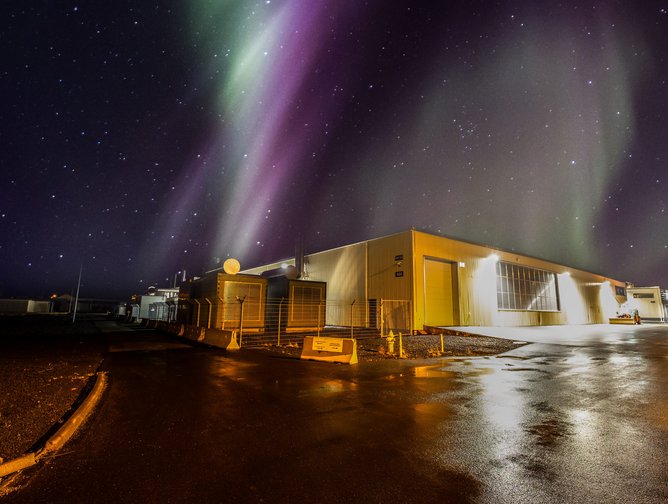Verne Global: Unlimited Potential, Backed by The Planet
The saying ‘location is everything’ has never been more suitable. Iceland is especially well placed to supercharge high intensity compute and meet the increasing demands of today’s and tomorrow’s data centres requirements.
Advantageously situated near Keflavik, Iceland, with its 40-acre data centre campus Verne Global has created the perfect environment to help both the planet and its people thrive. “The land of fire and ice” delivers on two critical aspects for data centres, cooling and power, in the form of its abundant renewable energy and perennially temperate climate. Today, Iceland’s grid is powered completely by renewable sources.
Geothermal and hydroelectric are highly stable sources of renewable energy. This stability also translates into predictable, long term pricing for Verne Global and its customers.
Dominic Ward, CEO at Verne Global, sums it up nicely, “At Verne Global, we are able to provide enough natural differentiation between us and our competitors because of the sustainable power availability, that is driven by 100% renewable energy from geothermal and hydroelectric power, and the natural climate, which enables us to provide the lowest cost, most stable and efficient power equation for our customers to run their high intensity and high performance compute from our campus in Iceland.”
“These two sources are renewable, stable and predictable, they don’t experience the fluctuations of solar, wind, or other renewable sources, and they come with considerably higher efficiency attached to them. This gives the data centre operators located in Iceland, such as Verne Global, a huge cost and efficiency advantage, which we're able to pass on to our customers. And we're able to do that with natural, renewable power and the lowest possible environmental impact.”
“The contracts that we have with our power companies enable us to provide power pricing to our customers ten years into the future at a fixed price. And that is not just unusual; it is unheard of and actually impossible anywhere else,” explains Ward.
He continues, “In certain countries, you can fix the price looking ahead for a couple of years, but in Iceland, as a result of the stable energy sources, you are able to have this fixed pricing availability. Furthermore, the cost is the lowest that you can find even in other Nordic locations for the distribution of power that has been made available to us. So we have this competitive advantage on power costs, which is fundamental as to why our customers decide to choose us to provide them with data centre services. We're able to give them the predictability over a decade if they want it. ”
“As a result, the total cost of ownership (TCO) can be reduced significantly because of that certainty, because of the ability to look longer-term. And that's really important for the type of customers that we cater to and the type of products and services that we're able to provide to them, whether they are focused on financial services, engineering, research or any other industry.
Besides the abundance of low-cost renewable energy available in Iceland, located on the edge of the Arctic Circle, the country also helps to deliver on the necessary cooling required for data centre hardware— again, playing into Verne Global’s ability to lower the TCO for its customers. “Because there's also a naturally stable temperature in Iceland that doesn't get too hot or too cold, with our ability to engineer and take advantage of that efficiency, we're able to achieve significant cost savings on our capital expenditure that then results in lower operating expenses for our customers in the short, medium and long-term. This means a significantly lower TCO, particularly for our customers who are able to think and act in the longer term,” says Ward.
The Power of Selective Partnerships
Tate Cantrell, Chief Technology Officer at Verne Global, says, “One of the important aspects to the success of Verne Global and our ability to drive sustainability through the entire stack of high-performance computing is our effort to work closely with partners. We're really excited with the advancements that we've been able to make, in particular with companies like Dell and NVIDIA, who are hardware partners that allow us to provide not only sustainable colocation services but the latest in high-performance hardware for our customers. Plus, because of the local partner ecosystem we have in Iceland, we're able to support any one of those provider’s hardware solutions all the way from the processing of an order to the installation within our high-density colocation environments, through to the operations of that infrastructure and ensuring that our customers can manage that equipment effectively, wherever they are in the world.”
Verne Global believes in working hand-in-hand with its carefully selected partners to ensure excellent customer success. Ward underscores the importance of partner selection. “We have long standing relationships with a fantastic number of partners, but we're very careful about selecting those partners. It's essential for us to get that right. We work with customers who are harnessing advanced technology, and we, therefore, have to be very selective because they'll be supporting our customers as closely as we are. Most importantly, we expect our partners to provide the same level of support to our customers— we see them almost as an extension of our service, and vice versa.”
Dell: Delivering Competitive Advantage
In providing colocation services, Verne Global believes it’s essential to allow customers to be creative and help them achieve whatever it is they would like to achieve. “And so we like to choose partners that allow our customers to be creative and be flexible. An example of that would be working with Dell,” says Tate.
He continues, “Dell is often one of the first OEM providers to take on new products. For example, we had a customer who is at the forefront of using GPU's to power the latest in financial services applications. And this customer wanted to be the first in Europe to take advantage of the new A100 chipsets that NVIDIA released over the last year. And Dell was one of the first OEMs that was able to provide a solution to them, and it came months earlier than some of the other products that were next available in the market.
“That's really important for our customers. They're focused on high-intensity computing, and they're focused on it because having a competitive edge in their industry is what allows them to have an increased turnover and increased productivity. And so, through our partnerships, we are enabling our customers to be at the forefront of the competitive landscape and to maximise their returns.”
NVIDIA: High-Intensity Computing of the Highest Level
Verne Global’s partnership with NVIDIA is yet another differentiator that provides its clients with a competitive advantage.
Verne Global was the first data centre in Europe to be approved to house NVIDIA’s DGX product, a line of servers and workstations specialised in using GPGPUs to advance deep learning applications. Tate puts it more simply, “DGX is NVIDIA compressing all of its technology into a single box that's super high intensity.
“You talk about high-intensity computing. This is the epitome of that,” Tate claims. However, putting that much horsepower into a single box means that it’s not just any data centre that has the ability to provide the environmental conditions necessary to be able to run the equipment.
That opened the door for Verne Global to provide what others couldn’t. Tate explains, “And so, establishing ourselves as a leader in technology innovation allowed NVIDIA to partner with us and allowed us to become a viable location where NVIDIA’s customers can deploy its DGX equipment. And not only a viable location, but one that can fuel the compute with 100% sustainable power.”
Ward jumps in to emphasise the point, “This is a really perfect example of what sets us apart because the horsepower behind this box makes it very different from a lot of other servers that you might see in a data centre. It is effectively what would be regarded as a supercomputer in one small box, around 25cm high. It draws a huge amount of power, and because it's so dense, highly capable and in such a small form, there are only a few data centres in the world that are capable of housing even just a few of these.”
High density, high-performance computing requires the right infrastructure, which is exactly what Verne Global has done, designing the necessary environment from the ground up to ensure it can cater for all its customers’ needs and scale their compute on demand. Its capability to handle high density compute capability at scale is what secured Verne Global its preferred partner status with NVIDIA.
Intel: Bringing Forward-Looking Intelligence
Over the course of the last two decades or so, Intel has found its way into most computers. Although, as of late, the company has begun seeing increasing competition, it very much remains highly dominant in the industry, and as such, makes for an integral partner and valued trusted advisor. “Intel caters to the vast majority of server chip technology and architecture that sits inside most data centres’ compute capability. As a result, we naturally have a very close relationship with the company because so much of that hardware also sits in our own data centre,” said Ward.
“Intel is very interested in the movement and the trends of high-intensity computing. We work closely together with Intel to provide solutions to a number of large customers.”
This leads us nicely into Verne Global’s ability to cater for new technology as it develops. As Ward explains, “We certainly see a huge prevalence of new hardware in our data centre that is GPU, the dominance there naturally being NVIDIA, but we have the ability to provide infrastructure for any new hardware that might appear going forward - at really significant densities. And so, whether that be FPGAs or ASIC devices, or newer technologies that are focused on AI and machine learning and AI chips, for example, they will inevitably be dense and power-hungry. And there are certainly some that are just starting to appear on the market more recently, such as IPU technology. And we'll see plenty more appearing going forward into the next couple of years.
“Because we have the ability to provide for density and our data centre has been built from the ground up, it is a natural home for high density compute infrastructure even as it continues to develop. And as we see the use of machine learning starting to become prevalent across all industries, we are also going to recognise much more scope for these higher intensity and denser chip and server types. And organisations will be looking for a home that can cater to that kind of density.
“At Verne Global, we are very much positioned for the future. We are certainly capable of looking forward and seeing what's coming; we know that we're able to cater for the higher density end of applications and the type of compute that is going to support that in the hardware that's coming down the line. But we're also - perhaps more importantly - able to cater for those other two major challenges organisations face. One of which is power availability, and Iceland has this massive natural abundance of power, the vast majority of which arguably remains untapped, meaning it has huge amounts of scalability and is sustainable. And lastly, the world is finally starting to realise the importance of sustainability. We stand in a fantastic position, and frankly, a unique position, through being able to provide our customers with that 100% renewable generation capability that organisations are now seeking more than ever.”


